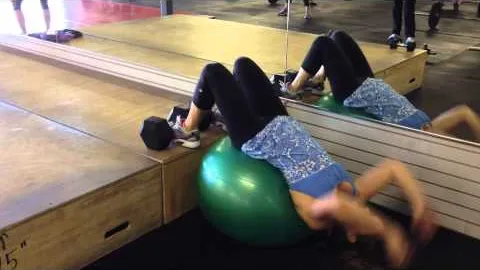
Are you looking to level up your core workouts? The Decline Stability Ball Sit-Up exercise might just be the perfect addition to your routine. This advanced variation of the traditional sit-up takes your core strength and stability to new heights, helping you achieve your fitness goals faster. In this article, we will dive deep into the benefits of the Decline Stability Ball Sit-Up exercise, how to perform it correctly, and why it should be a part of your regular workout routine.
Strengthen Your Core: The Decline Stability Ball Sit-Up specifically targets your core muscles, including your rectus abdominis, obliques, and transverse abdominis. By engaging and challenging these muscles, you will not only develop a stronger and more defined core but also enhance your overall stability.
Improved Balance and Stability: As the name suggests, the Decline Stability Ball Sit-Up exercise utilizes a stability ball, which adds an element of instability. This instability forces your core to work harder to maintain balance, thereby enhancing your overall stability and coordination.
Enhanced Functional Strength: Functional strength refers to the ability of your muscles to work together efficiently and effectively during everyday activities. By performing the Decline Stability Ball Sit-Up exercise, you mimic real-life movements and engage your core muscles in a functional way, making them stronger and more resilient for daily activities.
Reduced Risk of Injuries: Strengthening your core and improving your stability through the Decline Stability Ball Sit-Up exercise can significantly reduce your risk of developing injuries, especially in areas such as your lower back. A strong core acts as a stabilizer, protecting your spine and preventing unnecessary strain.
Versatility: The Decline Stability Ball Sit-Up exercise can be easily modified to increase or decrease the level of difficulty, making it suitable for individuals of all fitness levels. Beginners can start by performing the exercise without additional weights, while more advanced individuals can hold a dumbbell or a medicine ball for added resistance.
Before attempting the Decline Stability Ball Sit-Up exercise, make sure you have a stability ball and a decline bench or a sturdy platform to secure it. Follow these steps for proper execution:
Set Up: Position the stability ball on the decline bench, ensuring that it is securely in place. Sit on the ball with your feet firmly flat on the floor, shoulder-width apart.
Lie Backwards: Slowly roll your body back until your head, upper back, and shoulders are resting comfortably on the ball. Maintain a neutral spine, engaging your core muscles throughout the movement.
Cross Arms: If desired, you can cross your arms over your chest or place your fingertips behind your ears, avoiding any excessive pulling on your neck.
Engage the Core: Begin the exercise by contracting your core muscles and lifting your torso up towards the ceiling. Remember to keep your neck relaxed and your gaze forward, avoiding any strain on your neck muscles.
Controlled Descent: Lower your torso back down to the starting position, maintaining control throughout the movement. Avoid any sudden drops or collapses, and focus on engaging your core muscles to control the descent.
Repeat: Aim for 10-15 repetitions of the Decline Stability Ball Sit-Up exercise, gradually increasing the number of sets as your core strength improves.
To maximize the effectiveness and safety of your Decline Stability Ball Sit-Up exercise, keep these tips in mind:
Master the Form: Focus on maintaining proper form throughout the exercise. A neutral spine, engaged core, and controlled movements are essential for optimal results and injury prevention.
Start Slow: If you are new to the Decline Stability Ball Sit-Up exercise, begin with fewer repetitions and sets. As your core strength improves, gradually increase the intensity and volume of your workouts.
Listen to Your Body: Pay attention to any discomfort or pain during the exercise. If you experience any unusual pain, stop immediately and consult with a qualified fitness professional or healthcare provider.
Combine with Other Exercises: While the Decline Stability Ball Sit-Up exercise is excellent for targeting your core muscles, incorporating other exercises that target different muscle groups can provide a well-rounded workout routine.
Stay Consistent: Like any exercise, consistency is key. Make the Decline Stability Ball Sit-Up exercise a regular part of your routine to see progress and reap the benefits over time.
The Decline Stability Ball Sit-Up exercise is a highly effective and versatile core exercise that can take your fitness journey to the next level. By incorporating this exercise into your routine, you will strengthen your core muscles, improve stability and balance, and reduce your risk of injuries. Remember to focus on proper form, start slow, and listen to your body to ensure a safe and effective workout. So, grab a stability ball and give the Decline Stability Ball Sit-Up exercise a try—it might be just what you need to enhance your core strength and stability!
If you're looking for a gym, fitness club or yoga studio, you've come to the right place.
You can find information about gyms in your area. Browse catalog of gyms and find gyms with classes which are you looking for.
On gym page you can find simple information like address, phone or website. You can find list of available classes. You can check availability of personal training or small group classes. On place page you can also see information about open hours.
You can find gyms near you with amenities, courts, studios and equipments.
Use our map to find gym at your city or district.
In Gym Navigator you can find list of exercises with movies for many body parts.
You can browse exercises catalog and find exercises the best of you.
You can also find exercises grouped into workout plans, which you can use to improve you body. Each routine show you exercises one by one and give you possibility to count you progress and count down rest time.